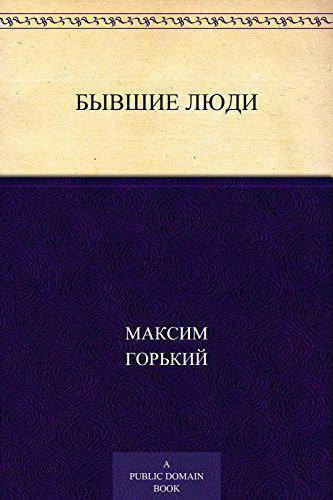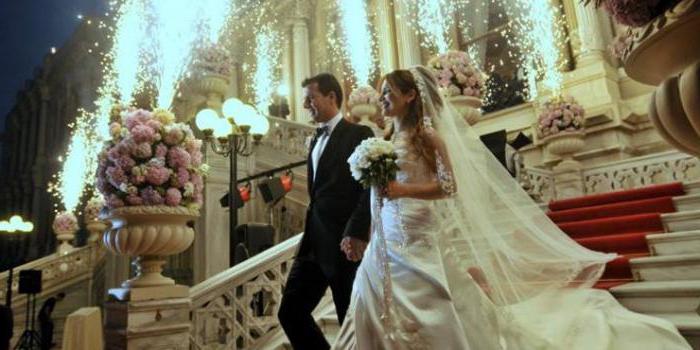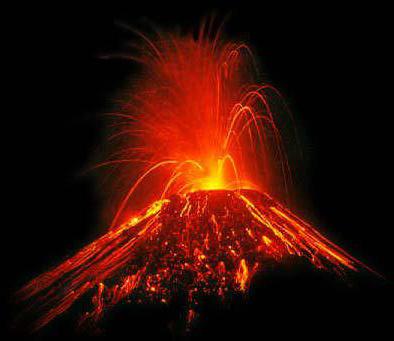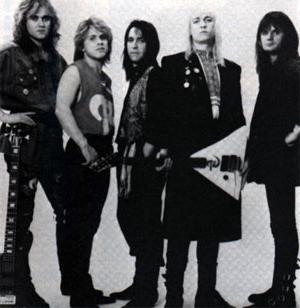"Former People" - a work created in 1897year It is based on the personal impressions of the author, which he received when he had to live in a doss house on the outskirts of Kazan. This work in the genre relation can be defined as an essay, since it is characterized by image reliability, lack of dynamics, attention to life, as well as detailed portrait characteristics. In Former People, Gorky re-evaluates the type of tramp. There is no romantic halo, familiar to us from his early works.
"Former People": a brief summary

Significant place in the first part is givendescription. First, we see a suburban street. She is dirty, sad. The little houses here are inconspicuous: with skewed windows and curved walls, full of holes in the roofs. We see heaps of rubbish and rubble. The following describes the house of the merchant Petunnikov. This is a crooked building with broken windows. Its walls are all speckled with cracks. In this house, a little like a house, there is a sleeping house. It resembles a dark, long hole.
Portraits of nomads
From the description of the interior, the author proceeds to the portraits of the hostels. What are the "former people" in the play "At the bottom" by M. Gorky?

Aristide Sledgehammer - the owner of the dockserved as a captain. He heads the company of the so-called "former people" and represents its "general staff". Gorky describes him as a tall, broad-shouldered man about 50 years old, with a pockmarked face swollen from drunkenness. He is dressed in a ragged and dirty officer's overcoat, and he has a greasy cap on his head.
The following are portraits of other hostels.One of them is Teacher. This is a round-shouldered tall man with a bald skull and a long, sharp nose. Another nightmare is Simtsov Aleksey Maksimovich, also known as Kubar. This man is a former forester. Gorky notes that he is "fat as a barrel." He has a small crimson nose, a thick white beard and cynical watery eyes.
The next occupant of the doss house is Martyanov Luka Antonovich nicknamed the End. Previously, he worked as a prison warden, and now - one of the "former people." This is a silent and gloomy drunkard.
Here also lives Pavel Solntsev (Littering), a mechanic.This consumptive, crooked man is about thirty years old. Further, the author describes Kiselnikov. This night hostess is a former convict. He is bony and tall, "a curve in one eye." He was nicknamed One and a half Taras, because his friend Taras, a former deacon, was one and a half times lower than him. Next, we get acquainted with the long-haired "ridiculous" young man "with a silly cheekbone mug." His nickname is Meteor. Then the author presents us and ordinary inhabitants of the doss house, men. One of them is Tyapa, an old ragman.
Characteristics of the nomads

Maxim Gorky draws our attention to howThese people are indifferent to their fate, as well as to the life and fate of others. They are apathetic, are powerless in front of external circumstances. In their soul at the same time grows anger, which is directed against wealthy people. By the way, the world of "former people" in the play "At the bottom" by M. Gorky very much resembles the one created in the essay in which we are interested.
Conflict with Petunnikov
In the second part of the work, the discontent of allthese characters translate into open conflict with Petunnikov, a local merchant. The nature of this conflict is social. The captain noted that some part of the merchant's plant was on the land of Vavilov. He persuades the innkeeper to file a lawsuit against Petunnikov. It should be noted that Aristide Sledgehammer in this case is not driven by the desire to profit. He just wants to annoy Petunnikov, who he calls himself hateful Judas.
Result of opposition
However, the lawsuit, which promised 600 rubles, endsworld. Business, educated and cruel son Petunnikova convinces Vavilov of the need to withdraw the lawsuit from the court. Otherwise, he threatens to close the pub, which contains an innkeeper. The inhabitants of the doss house understand that now they will need to leave their familiar place, because the merchant, of course, will not forgive this offense.

Soon, Petunnikov really requiresimmediately leave the hut. But the troubles do not end there. Uchiel dies, whose death is blamed on Aristide Kuvalda. So the community of hostels finally collapses. Petunnikov triumphs.
Psychology of heroes
Much attention Maxim Gorky pays not onlythe study of the life of the so-called former people. He is also interested in their psychology, inner world. The author believes that living in a doss house generates people who are weak, who are not capable of rebirth, towards self-realization. They deny everything, including their own lives. Such a position (its ideologue - the Sledgehammer) is destructive and unpromising. It lacks a constructive, positive beginning. And discontent, which is caused by impotence, can only give rise to despair and anger.

We can say that Maxim Gorky (his portraitpresented above) in his essay "Former People" imposes a sentence on the inhabitants of the "bottom". These are fallen, impotent and inactive characters. Analysis of the essay "Former People" shows that they are not capable of good feelings and actions. In this regard, the episode of the death of the Master is indicative. The sledgehammer, who considered this man to be his friend, could not find even human words for him. The social problems reflected in the stories of the skew cycle will continue to develop in the plays of Maxim Gorky.
Difference of work from physiological essays
В физиологическом очерке основным предметом the images were the social roles of the heroes, not specific characters. The authors were interested, for example, a Petersburg organ-grinder, a Petersburg janitor, cab drivers, officials, merchants. In the artistic essay, which was created by M. Gorky ("Former People"), the main attention is paid to the study of the characters' characters, which are united by their social status. The heroes were in a night shelter, at the very bottom of life. The lodging house is kept by Aristide Sledgehammer, who himself is a “former” man, because he is a retired captain.
Lack of autobiographical hero
Some other features may be noted.works. For example, in the "Former People" there is no autobiographical hero, an image so familiar to Gorky. The narrator in this work seems to want to distance himself from everything and not to betray his presence. We can say that his role in the work "Former People" by Maxim Gorky is somewhat different than in the series "In Russia" or in the romantic stories of the author. The autobiographical hero is not a character listener, interlocutor. Only the details of the portrait of the young man, whom the Maul nicknamed Meteor, and the characteristic of how he relates to others, allow us to discern in him an autobiographical hero. True, he is somewhat distanced in this work from the narrator.
The transition from romanticism to realism
The main thing that distinguishes the "former people" fromGorky's works relating to early work is a transition from a romantic interpretation of the character to a realistic one. The author still depicts people from the people. However, his appeal to realism allows him to show much more clearly the contrast between the dark and light, weak and strong points of the national character, its inconsistency. This is the subject of research in the work "Former People".
It seems that the author, taking the position of realism, does notcan find a way to solve the conflict between a person’s purpose (his height) and his tragic lack of realization in the life of "former" people, the low social position that they occupy. The irresistible nature of this conflict makes Gorky in the final landscape return to the world view of romanticism. Only in the elements can you find the resolution of the unsolvable. The author writes that there was something inexorable and tense in the severe gray clouds that completely covered the sky. As if they were about to burst into rain and wash away all the dirt from the sad, exhausted land. However, in general, the landscape is realistic. It is necessary to say a few words about him.
Landscape
In the early stories of the author romantic landscapewas intended to emphasize the uniqueness of the characters, and the spirituality and beauty of the southern night, the horror of the dark forest, or the endless free steppe could be the backdrop against which the romantic hero revealed, claiming his ideal at the cost of his life. Now Gorky Maxim ("Former People") refers to a realistic landscape. He is interested in his anti-aesthetic features. Before us appears the ugly outskirts of the city. Dim colors, lack of brightness, pallor are needed to create a sense of abandonment of the environment in which the nomads live.
Conflict

The author tries to understand how great the social andpersonal potential of the so-called "former people". It is important for him to find out if they can find themselves in difficult living and social conditions, to preserve spiritual, intangible values that can be opposed to a world so unfair to them. The peculiarity of the conflict is determined by this aspect of the problem. Conflict in the work has a social character. After all, the nightmares, led by Sledgehammer, oppose the merchant Petunnikov, as well as his son - a cold, strong, intelligent and educated representative of the Russian bourgeoisie.
The author is more interested in non-socialaspect of this confrontation, and the unwillingness of the heroes to comprehend their own position, possible perspectives, their needs. It is not a foreign land that interests them or even money. This is only a manifestation of the hatred of the poor drunkard to the hard-working and rich man.

Горький раскрывает полное отсутствие в "бывших people of "creativity, internal growth, activity, self-improvement. But these qualities are very important for the author. They are presented in the novel" Mother ", as well as in the hero of his autobiographical trilogy. The inhabitants of the dock house can not oppose anything to the surrounding reality, except malice. leads them to the very "bottom." Their anger turns against themselves. Nothing is achieved by their opposition to the merchant "former people".












